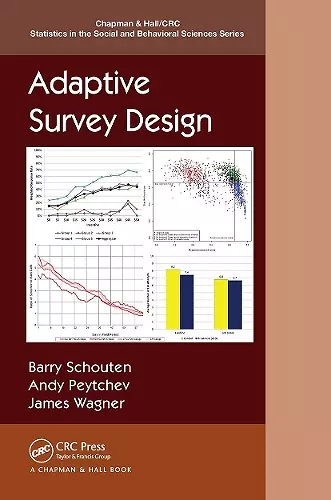Adaptive Survey Design
Barry Schouten author Andy Peytchev author James Wagner author
Format:Hardback
Publisher:Taylor & Francis Inc
Published:4th Aug '17
Currently unavailable, and unfortunately no date known when it will be back
This hardback is available in another edition too:
- Paperback£51.99(9780367735982)

Adaptive survey designs (ASDs) provide a framework for data-driven tailoring of data collection procedures to different sample members, often for cost and bias reduction. People vary in how likely they are to respond and in how they respond. This variation leads to opportunities to selectively deploy design features in order to control both nonresponse and measurement errors. ASD aims at the optimal matching of design features and the characteristics of respondents given the survey budget. Such a goal is sensible, but ASD requires investment in more advanced technical systems and management infrastructure and asks for the collection of relevant auxiliary data. So what are current best practices in ASD? And is ASD worthwhile when the same auxiliary data are employed in the estimation afterwards? In this book, the authors provide answers to these questions, and much more.
"Adaptive Survey Design is a mathematically rigorous discussion of a new set of tools for managing surveys more efficiently, written by three of the world’s leading experts on these tools. Surveys around the world face growing challenges—higher costs, lower response rates, use of mixed modes of data collection—and adaptive designs have emerged as one response to this more difficult climate. This book presents a thorough explanation of adaptive survey design and makes a convincing case for the value of such designs. The book represents an important contribution to the literature on survey design. "
—Roger Tourangeau, Vice President and Associate Director, Westat
"This book will be an invaluable resource for survey managers, survey statisticians, and survey methods students. It is set to become the landmark text on adaptive survey design. While adaptive designs have come of age and are now being used or tested by many survey agencies, there has been a lack of clear or consistent guidance. This book provides just such guidance, while also being refreshingly honest about aspects that still require more research. The practical experience of the authors shines through, particularly in the case studies. These, and the simple summaries at the end of each chapter, should prove most useful to anyone wanting to implement an adaptive design of their own. This book is a very useful addition to the survey methods literature."
—Professor Peter Lynn, University of Essex
"This is the first comprehensive book that is dedicated solely to such designs and I have no doubt that it will become the authoritative book on the subject with a lasting legacy effect. The book culminates many years of research by the authors with their colleagues and co-authors, and is a one-stop source for those interested in implementing such designs. It is a valuable up-to-date and accessible resource for both statisticians and survey practitioners
ISBN: 9781498767873
Dimensions: unknown
Weight: 542g
266 pages